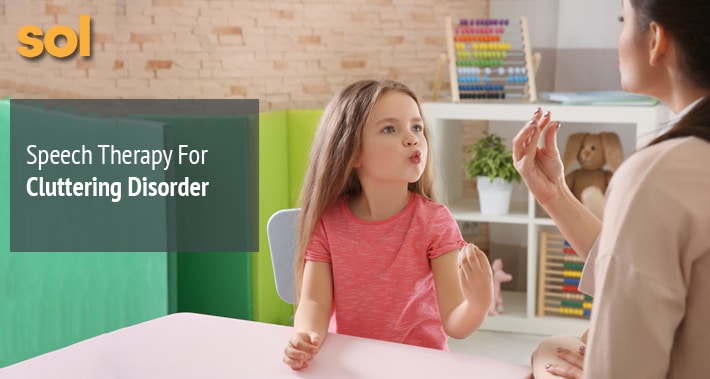
Does your flow of speech get interrupted by irregular rates, rhythms, and disfluencies?
If this is the case, you may have a fluency disorder.
Fluency disorders can take on different forms and interfere with your ability to effectively communicate with those around you.
Cluttering is a fluency disorder that can significantly disrupt your communication skills and self awareness in regards to moments of disrupted speech.
If you have a fluency disorder, like cluttering, there are therapies and techniques that can help you improve your speech.
At Sol Speech and Language Therapy, we can work with you to help treat and manage your fluency disorder.
Each speech therapy clinic is run by qualified and licensed therapists offering pediatric speech therapy as well as speech therapy for adult.
If you suspect you or your child has a cluttering disorder, we’re here to help you navigate it.
Let’s take a closer look at what a fluency disorder is and how cluttering disorder can affect you.
What Is Fluency Disorder?
Before getting into what a fluency disorder is, let’s look at what fluency is.
Fluency relates to the rate, effort, continuity, and smoothness of speech production.
A fluency disorder occurs when there are interruptions to the flow of speech.
These interruptions are marked by speech with an irregular rate and rhythm, as well as disfluencies.
Disfluencies are irregularities that occur in the flow of speech.
These include repetitions of sounds, words, syllables, or phrases, blocks in your speech, and prolongation of certain sounds.
These symptoms may also be accompanied by other mannerisms, speech avoidance, elevated tension, and struggle behaviours.
Stuttering is the most common fluency disorder.
Stuttering interrupts the flow of speech through repetitions, prolongations, and sound blocks.
This causes functional communication issues, but it can also cause anxiety, depression, and other emotional and social issues.
What Is Cluttering Disorder?
Cluttering is a fluency disorder.
Cluttering involves a perceived rapid or irregular rate of speech.
This can mean abnormal pauses, disruptions in the flow of your speech, pragmatic issues, omittance and collapse of syllables, excessive disfluencies, and language formation issues.
Cluttering disorder affects you by breaking down your fluency and clarity of speech.
You may also experience a decreased awareness of having fluency problems or moments of disfluency.
This can leave you unaware that you’re having communication issues and allows them to continue without treatment.
Ultimately this can impact the effectiveness of your social interactions.
People can experience cluttering independently or cluttering accompanied by stuttering.
Cluttering can also occur alongside other disorders such as learning disabilities, autism spectrum disorder, ADHD, Tourette’s, or central auditory processing disorder.
How Do You Know If You Have Cluttering Disorder?
There are several signs and symptoms that may indicate that you have cluttering disorder.
If you have cluttering disorder your rate of speech might be rapid or irregular.
You might also have something called “excessive coarticulation” in your speech.
This is a change in speech articulation that combines the current speech segment with the following one.
This can result in the omission or collapse of syllables and word endings.
What that looks like is something like “I neegosto” instead of “I need to go to the store.”
Another sign of cluttering is what are called excessive disfluencies.
These are interruptions in the natural flow of your speech.
But cluttering disfluencies are different than those associated with stuttering.
Cluttering disfluencies tend to be full of filler words like “uh”, “um”, “like”, etc.
They also tend to be pretty rapid fire – you’ll speak in a short, quick burst, then pause, then start again.
Usually, these pauses are at points that don’t make much sense from a grammatical perspective.
These random pauses can cause your speech to have an unusual rhythm or sound.
It’s generally thought that people with a cluttering disorder speak faster than their systems can handle.
This can result in others having difficulty understanding you.
What’s more, if you have a cluttering disorder, you might not even recognize you have one.
Stuttering is fairly well known, so the average person tends to be better at recognizing its signs.
But cluttering isn’t as commonly understood.

Why Do People Clutter?
There isn’t a lot of research available that pinpoints the direct causes of cluttering.
However, there are factors that may contribute to its presence and development.
Neurological Factors
Cluttering has sometimes been found to occur at the same time as other neurological disorders.
These disorders can include ADHD, autism, Tourette’s syndrome, central auditory processing disorders, and other learning disabilities.
It may also be related to some complications in different parts of your brain.
This can include the anterior cingulate cortex, which controls impulse control, decision making, empathy, and some other emotional responses.
It may also be related to your basal ganglia, which controls your motor skills and executive function, and your premotor cortex, which also plays a role in motor skills.
These areas tend to be more active in people with cluttering disorder.
Self Regulation In Speech Production
What this basically means is that the thoughts of a person who clutters emerge before they are ready to be sustained.
When a person with cluttering disorder speaks, they do so at a rate that’s too fast for their system to keep up with.
This causes the cluttering pattern – they speak too quickly, and need to stop to catch up.
Potential Risk Factors
While there are no specific risk factors for cluttering, there are some potential factors that may contribute to it.
It tends to run in families – if others in your family have a cluttering disorder, you’re more likely to clutter yourself.
It sometimes comes along with a stuttering disorder or other speech disorders as well.
Men are also more likely to have a cluttering disorder.
How Can Speech Therapy Help With Cluttering Disorder?
Having a fluency disorder can significantly impact your everyday activities and can interfere with your social interactions.
Speech therapy can help you communicate more clearly so that others around you can understand you more easily.
If you suspect you or your child have a cluttering disorder, the first step is to do a speech therapy evaluation.
From there, your speech therapist will determine whether it’s a cluttering disorder or something else.
Assuming it is cluttering, your speech therapist will take the time to understand how your cluttering disorder affects you specifically.
From there, part of the approach is to help you build awareness about when you’re cluttering, and how you can better regulate your speech.
Your speech therapist may work with you to over-emphasize certain words or parts of words.
This is especially true with longer words that can collapse into themselves with a clutter.
It’s also important to build awareness of the volume of your speech.
People who clutter tend to decrease their volume at the end of a sentence – your speech therapist can help you maintain a steadier volume.
Book Your Appointment With Sol Speech And Language Therapy Today
If you suspect you may have a cluttering disorder, there are treatment options available for you.
At Sol Speech and Language Therapy, we’re here to help you communicate more clearly to those around you.
Through speech therapy you can improve your communication, manage your symptoms, and gain more confidence.
Book your appointment with Sol Speech And Language Therapy today.
6448 E Hwy 290 Suite E-108,
Austin, TX 78723
(512) 368-9488
» https://g.page/r/CfRfhOpEQm7BEAE
Sol Speech & Language Therapy
555 Round Rock W Dr E-221,
Round Rock, TX 78681
(512) 808-3953
» https://g.page/r/Cb5pwCTosSEfEBM
Sol Speech & Language Therapy offers personalized skilled intervention to those struggling with their speech and language skills. Services offered include screening, consultation, and comprehensive evaluation. We also provide one-on-one and/or group therapy for speech sound disorders, receptive/expressive language delay/disorder, stuttering/cluttering, accent reduction, and much more.